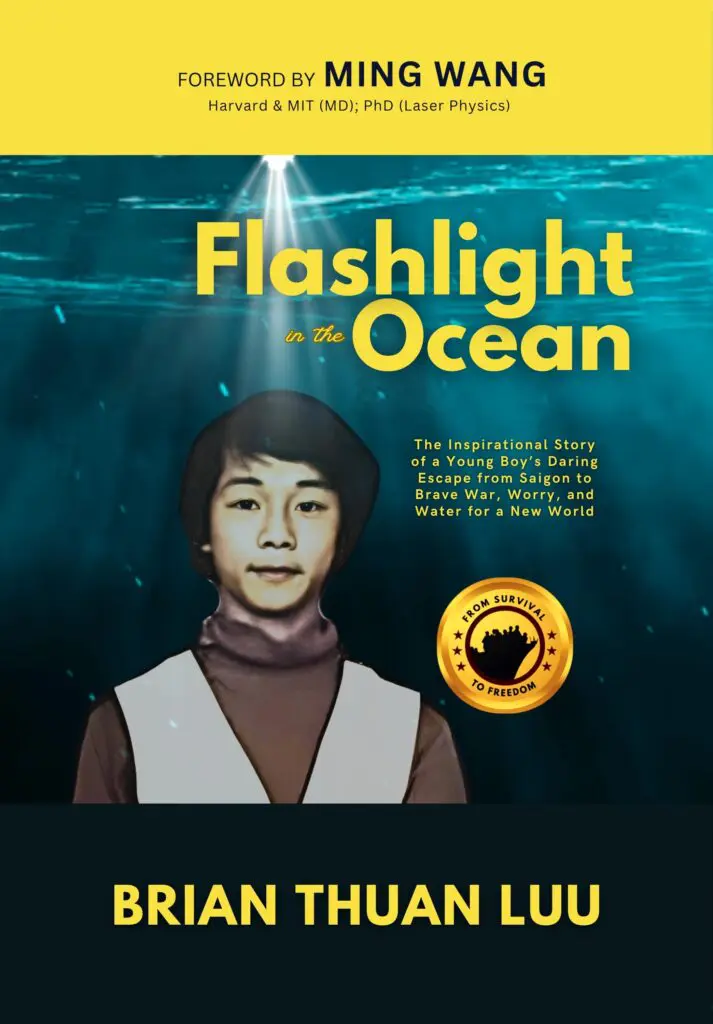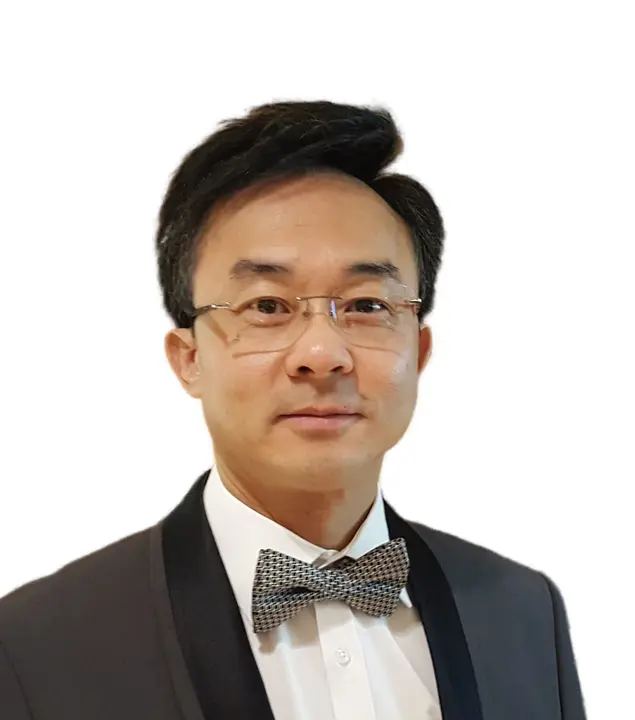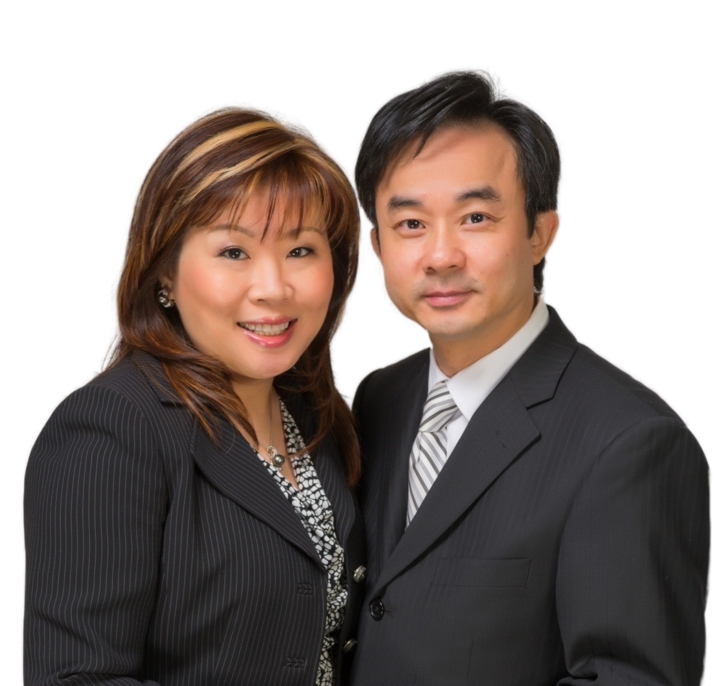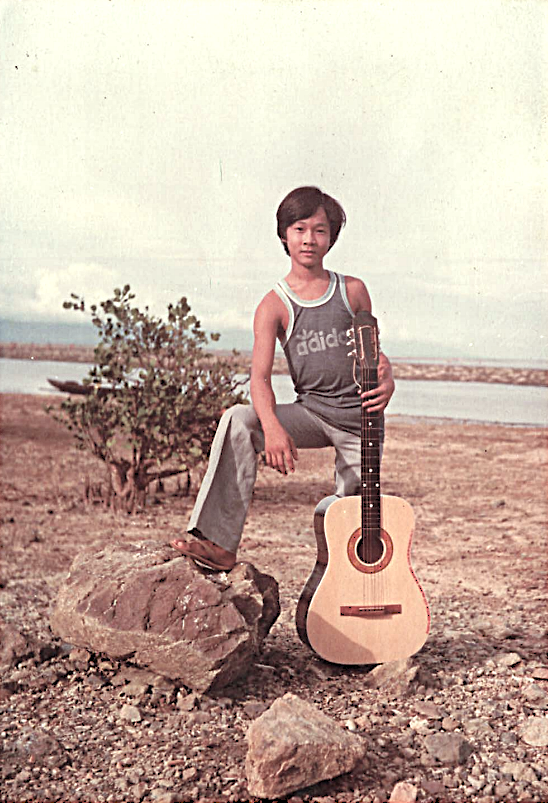On His Memoir: ‘Flashlight in the Ocean‘

When I wrote “Death of the Good Girl,” I learned firsthand how difficult—yet necessary—it is to confront the shadows of our past and share them with the world. Stories of survival and reinvention are the bridges that connect us, even across oceans.
In that spirit, I had the honor of interviewing local author Brian Thuan Luu (Long Island), whose extraordinary memoir, “Flashlight in the Ocean,” illuminates one of the most harrowing and inspiring journeys I have ever encountered. At just 13 years old, Brian left Vietnam alone, armed only with a small flashlight, his brother’s love, and a dream of freedom. What follows is a conversation about survival, resilience, and the enduring power of hope.
Dr. Williams: Brian, you were just 13 when you left Vietnam alone. What do you remember most about that first night at sea, holding the flashlight your brother gave you? Did you understand then how significant that moment would be in shaping your life?
Brian Thuan Luu: I didn’t need the flashlight at first. There were lights all over the boat. But after the fourth day, when we were stranded on a coral reef, the top deck collapsed. All the lights went out except for one in the cabin. That night, it was pitch dark, and the rain was pouring. The only way I could move around was with the flashlight—without it, I would’ve stepped on people sitting everywhere. I was cold, hungry, and exhausted. I needed shelter. I spotted a family using a tarp to shield themselves from the rain, and when I crawled under, the man thought I was his son and let me stay.
At 13, I didn’t fully understand the weight of that moment. I was scared—just trying to survive. Looking back now, I realize that night marked the beginning of everything that followed: my independence and resilience. That flashlight wasn’t just a tool for light. It symbolized trust—my brother’s belief that I could make it. I still carry that with me.

Dr. Williams: Being stranded on a coral reef with 358 others for ten days sounds unimaginable. What did hope look like during those days? Where did you find strength when food, water, and even certainty ran out?
Brian: Sometimes I lost hope, but I thought of my mom’s words. She always said I would live a long life because I was a breech baby—I came into the world feet first, my legs stuck for hours, turning black and blue. The doctor warned she might lose me, but she agreed to let him pull me out. I survived.
She also told me, “Whenever you are in trouble, just pray,” and that’s what I did. When I ran out of food and water, I found strength in remembering my parents’ sacrifices. They had given up everything and spent so much gold so I could have a chance at freedom. That kept me going.
Dr. Williams: You lived through something most of us can’t even begin to imagine, and yet you buried much of it for decades. What made you ready to tell your story now?

Brian: For a long time, I kept my story private. But over the years, I realized it wasn’t just about me—it was part of a larger story of resilience, sacrifice, and survival. I wanted to honor the Vietnamese Boat People who risked everything for freedom and to preserve the stories of those who survived—and those who didn’t.
Dr. Williams: That flashlight became such a powerful image in your book. What did it symbolize to you then, and what does it represent to you now as a father, entrepreneur, and storyteller?
Brian: Back then, the flashlight meant guidance and safety. In the darkness, it was a reminder that I wasn’t completely alone. Now, years later, it represents hope, responsibility, and legacy. As a father, an entrepreneur, and a storyteller, I see it as a beacon—a reminder that even a small light can guide you through the darkest times.
Dr. Williams: Your journey didn’t end when you reached America—it began a new struggle. What was the most challenging part of finding your place here? How did you build a life from so much loss and trauma?
Brian: The language barrier and cultural differences were the hardest parts. I felt extremely lonely because my parents were still in Vietnam. Little by little, I overcame it through counseling and prayer. I was even bullied at school. But one day, some students asked if I knew Bruce Lee. I said yes. They asked if I knew Kung Fu. I said yes—though I barely knew anything. I showed them a few moves I’d seen from Bruce Lee, and after that, they left me alone. Back in the early ’80s, if people thought you knew Kung Fu, they didn’t mess with you.
Dr. Williams: You eventually found your voice in music and event production, creating joy and connection for others. How did your time in the refugee camp, where music first lifted your spirits, shape your love for performance and storytelling?
Brian: Performing back then wasn’t about fame or money—it was about lifting spirits and bringing people together in the middle of struggle. That experience showed me the true power of storytelling and entertainment: to heal, to connect, to inspire.
Dr. Williams: What do you hope young people, especially those who feel displaced or unseen, take away from your story?
Brian: I hope they take away a few things:
- The Power of Resilience: Life is unpredictable. You may face hardships you never expected, but you can survive and rebuild.
- The Importance of Hope: Hope kept me alive at sea, in the refugee camp, and while starting over in a foreign country. Hope is a choice—believing in a better future, even when everything seems hopeless.
- Gratitude and Compassion: Always remember where you came from. Be grateful for what you have, and be kind to those who are struggling.
Dr. Williams: Brian, when did it hit you that this story needed to become a book? And what was the first step you took toward writing it?
Brian: After sharing my story with people, many said, “You need to put your experiences into words.” So I started brainstorming and trying to remember everything. Luckily, I had kept journals over the years. They helped me recall the details, the emotions, and the moments that shaped my journey.
Dr. Williams: Memoirs can take us back to places we’ve worked hard to leave behind. Were there moments during the writing that became almost too painful? How did you push through?
Brian: Reliving certain memories was painful. Sometimes, I had to step away from the page to catch my breath or wipe away tears. It wasn’t easy. But I kept reminding myself why I started writing: to honor the past and inspire others. And, like my mom always told me, I prayed through the tough moments.
Dr. Williams: The structure of “Flashlight in the Ocean” beautifully balances your escape with your life after arriving in the U.S. How did you decide what to include, what to hold back, and how to pace the story?
Brian: Structuring the book was one of the hardest parts. I decided to tell it chronologically so readers could walk the journey with me, from the quiet moments before I left Vietnam to the chaos at sea, and the confusion and loneliness of starting over in America. I wanted people to feel every step it took to get here.
Dr. Williams: “Flashlight in the Ocean” is such a beautiful, haunting title. Was that always the name?
Brian: Originally, I wanted to call it “My Odyssey,” but after some research, I realized that title had been used a lot. My friend Scott suggested “Flashlight,” since I loved flashlights so much. My wife liked the idea but thought it needed more, so she suggested “Flashlight in the Ocean.” As soon as she said it, it felt perfect.

Dr. Williams: Now that the book is out, what’s the most unexpected thing someone has said to you about it?
Brian: One friend said, “I didn’t know people could survive something like that.” That stopped me in my tracks. Also, hearing from readers who shared their own stories with me has been incredible. One even said she felt like she was right there with me. Those moments remind me why I wrote this book.
***
Speaking with Brian Thuan Luu reminded me why stories matter—not just the telling but also the living. Flashlight in the Ocean is not only about one boy’s survival at sea; it’s about how moments of light, however small, can shape a lifetime.
Like many of us who have struggled to find our voices after trauma, Brian’s journey proves that even the darkest nights can produce the brightest beacons. I’m grateful he chose to share his light with us, and I hope his story inspires you, as it has inspired me, to honor your own resilience, and never to lose sight of where you come from.
“Flashlight in the Ocean” can be purchased on Amazon or anywhere online where books are sold. Brian’s book page can be found at www.traitmarkermedia.com/flashlightintheocean, and he can be reached at [email protected].